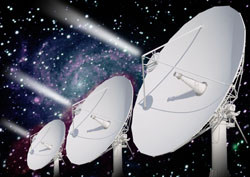Astronomy looks into the future
The OPTICON (Optical infrared coordination network for astronomy) project sought to identify open challenges for optical and infrared astronomy across Europe. Its ultimate goal was to underline opportunities where progress can be made through collaboration and to take action to achieve this. OPTICON provided a framework that allowed joint actions to improve the quality of Europe's infrastructures for both night-time and daytime (solar) astronomy. It formed part of the Seventh Framework Programme's (FP7) focus on infrastructure development and involved many of Europe's astronomical observatories, data centres and laboratories. Research was dedicated to developing lasers, fast, sensitive detectors and adaptive optics. New instrumentation was investigated to allow astronomers to approach the upper limits of angular resolution. Preparing the ground for the future European Extremely Large Telescope (E-ELT), with a hundred times the power of today's instruments, was a key aim of the OPTICON project. On the other hand, OPTICON's networking activities ensured the widest possible community for next-generation research facilities. The transnational access programme opened up Europe's major telescopes, as well as world-class facilities in the Canary Islands. In addition to supporting qualified users, training was offered to new astronomers, especially scientists from central Europe. The multinational team of experts created a state-of-the-art technical environment that encouraged both skills development and research excellence. OPTICON also contributed towards a strategic plan for Europe's future astronomical infrastructures. The next step is implementation, for which an extension of the project until 2016 has been approved by the EU.
Keywords
Astronomy, optical, infrared telescopes, observatories, European Extremely Large Telescope



